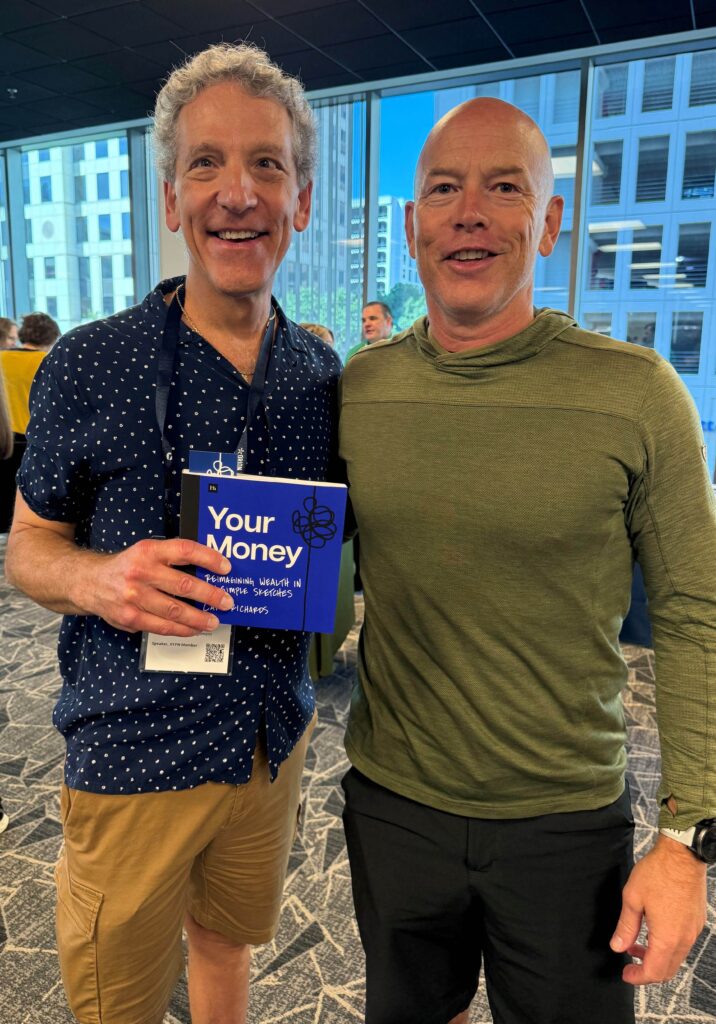Watch the conversation
🎥 Tax Planning, Not Reporting with Carl Richards → [WATCH LINK]
Prefer to read? The edited transcript appears below.
What we cover in Episode 5 (Tax Planning, Not Reporting)
In this episode, I sit down with Carl Richards—a certified financial planner, author, and creator of The Sketch Guy column in The New York Times. Carl is known for his simple yet powerful sketches that make financial concepts easy to understand, as well as his best-selling book The Behavior Gap.
Good tax work looks forward, not backward. Carl and I cover the mindset of tax planning—timing income/deductions, coordinating accounts, and aligning moves like Roth conversions or QCDs with your broader plan and values. Education, not advice; proactive, not reactive.
Key ideas
- Planning vs. reporting: file what happened; plan for what could happen.
- Timing matters: income, deductions, and withdrawals don’t all “count” the same.
- Coordination wins: accounts, benefits, and charitable tools should work together.
| One Small Step (this week)
Book a 60–90 minute pre-year-end tax check-in • Pull YTD income, withholdings/estimates, and expected changes. |
Phil Weiss
For the last one, I’m going to take us in a little bit different direction.
Carl Richards
Sure.
Phil Weiss
And that’s the one about tax planning, not reporting, which is something I talk about with people a lot. And perhaps it’s partly because of my professional background, but I know how important it is. Just this idea that we get to the end of the year, we don’t even want to think about taxes until we start receiving the mail in February that contains the 1099s and all the necessary filing information. And then we’re like, ‘What can I do?’ Well, it’s too late.
Carl Richards
That sketch is a simple bar graph for people listening that says the taxes you paid, and it’s a big bar. And there’s a shorter bar that says the taxes you could have paid, and the difference is called tax planning (or lack of planning). And again, I want to be clear: I’ve told my CPA that I want to be, on a one-to-ten scale of aggressiveness about how I’m going to treat my taxes, I want to be a one.
I want to be a one, but I certainly don’t want to miss out on things that are clearly spelled out. Like, are you tracking your mileage when you drive for specific work purposes? Right? Like, are there very specific things that are completely okay within the tax code? In fact, they’re meant to be used. They’re there to be used. Well, you’re pointing to a real challenge. Again, deep empathy for the best CPAs in the world. Even the best CPAs in the world, because of the pressure of their job, often don’t have time to be strategic. You know, they’re going to be really good at reporting on what has already happened. That’s their job.
Now, there are some really good ones that have built their businesses around the idea of being strategic. But largely, that’s a challenge. And so, I think we need to be just more thoughtful. A good financial advisor can do that if they’ve got expertise like you do. And I don’t know if I would use the word ‘should,’ but a good financial advisor can do that. That would be one place where they would be really valuable.
But just the idea of like, ‘Could you just simply set aside 90 minutes every quarter, personally, to ask questions of ChatGPT, to ask questions of your financial advisors, to ask questions of your CPA, like, hey, what should I be thinking about? Anything here? Could we run an estimate?’ I know I have an estimate run every quarter, and stuff comes up every year in mid-year where we’re like, ‘Hey, we should be thinking about this.’ So yeah, I think that’s a smart one to end on.
Phil Weiss
And just one last question about that. Can you talk about any kind of mindset shifts that you see when people start seeing taxes as this year-round thing instead of just April paperwork?
Carl Richards
I think, I don’t know about a mindset shift, but I can certainly point to the feeling. It’s such a better feeling to feel like I’m on top of this. I’ve thought about it, and there are no surprises. There was actually a mistake made last year, and it was a good mistake, right? Like, I made more money than we thought I would make. But it resulted in a pretty surprising tax bill because there was something missed, and my CPA actually totally owned it. And it was like, I can’t believe I blew that. That’s completely my fault. It didn’t result in my paying more than I should have. I just didn’t know it. And I didn’t like that feeling. Right? That’s just one example of where no mistake was made. I didn’t pay more. There was probably nothing we could have done differently. I just didn’t know.
And it resulted in me having to pay, and having a surprise. And the surprise was accompanied by, guess what? You earned way more than you thought. Well, that’s great. But I didn’t like that feeling. It’s a much better feeling to be like, no surprises. We’re on it. Is there anything? I love the idea of being able to say, ‘Is there anything we haven’t thought of,’ and largely being able to say, I don’t think there is. I mean, there is. So the feeling, I think, is really important. And I think that does result in a mindset shift, too.
Phil Weiss
I agree. And so I’m going to wrap it up here. I want to thank you so much for your time and for this book. And I’d love it if you could just tell people where they can find more information about it.
Carl Richards
And thanks, Phil. It was a very thoughtful conversation. The book is called, Your Money: Reimagining Wealth Through 101 Simple Sketches. You can find it anywhere books are sold. My favorite suggestion is, and it’s really interesting. This is sort of like really inside baseball, but you don’t realize how important pre-sales are to people, to the success of the book. So, I’ve been suggesting to people, buy one copy from Amazon and order one from your favorite local bookstore. If you do both of those things, it’ll help get the book in more hands, and I think you’ll really, really love it. Everything about it was meant to spark these kinds of conversations. And so, whatever we covered, let’s say 6, there are 95 more for you in the book.
Phil Weiss
Having read it, I know how easy it is to recommend it. It’s an easy read. It’s quick and it makes you think. And, as we’ve shown here, it can lead to really good conversations. So, I’d like to thank you just for writing it. I think it’s great.
Carl Richards
Yeah, well, thanks, Phil. Thanks for the conversation.
Phil Weiss
Thank you, Carl. I appreciate it.
Carl Richards
Yeah, cheers.
Phil Weiss
Cheers.
FAQ—Tax Planning, Not Reporting
1. What’s the difference between planning and reporting?
Reporting looks backward (last year’s return). Planning looks forward—timing income/deductions, coordinating accounts, and avoiding avoidable taxes.
2. What are common planning opportunities?
Roth conversions in low-income years, qualified charitable distributions (QCDs) after age 70½, thoughtful asset location, and coordinating Social Security/Medicare with withdrawals. (This is education, not advice.)
3. When should I start?
Many opportunities expire at year-end. We focus on proactive moves that fit your broader plan and values.
4. What should I gather for a planning session?
YTD pay/withholding, expected bonuses/RSUs, prior-year return, RMD/QCD status, charitable plans, health coverage (for IRMAA/ACA), and account statements.
All Episodes:
- Real Financial Planning → [EP1]
- Four Sources of Capital (TEAM) → [EP2]
- A One-Page Plan → [EP3]
- Goals Are Guesses → [EP4]
- Tax Planning, Not Reporting (You are here)
Full Interview & Series Wrap
Watch the full conversation → [FULL]
Series Wrap: This concludes our 5-part series with Carl Richards. Revisit any episode to put the ideas into practice and share the series with someone who would benefit.
Our practice continues to grow through introductions from our clients and friends. Thank you for your trust.
If you would like to discuss financial topics, including navigating new beginnings, managing your investments, creating a life plan, or saving for retirement, please complete our contact form or schedule a call or a Zoom virtual meeting. We will be in touch.
Follow us:
Facebook | LinkedIn | Instagram | YouTube
Please note: We post information about articles that can help you make better money-related decisions on LinkedIn, Instagram, and Facebook.
For firm disclosures, see here: https://apprisewealth.com/disclosures/




